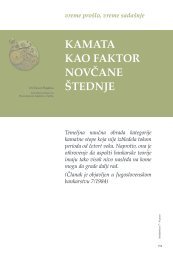swift - Udruženje banaka Srbije
swift - Udruženje banaka Srbije
swift - Udruženje banaka Srbije
- TAGS
- swift
- banaka
- srbije
- www.ubs-asb.com
Create successful ePaper yourself
Turn your PDF publications into a flip-book with our unique Google optimized e-Paper software.
ankarstvo � - � ����<br />
��<br />
What is SWIFT and how is it organized?<br />
SWIFT is the Society for Worldwide<br />
Interbank Financial Telecommunication, a<br />
member-owned cooperative through which the<br />
financial world conducts its business operations<br />
with speed, certainty and confidence. Over 9,000<br />
banking organisations, securities institutions<br />
and corporate customers in more than 208<br />
countries trust us every day to exchange<br />
millions of standardised financial messages.<br />
SWIFT has its headquarters in Belgium and<br />
has offices in the world’s major financial centres<br />
and developing markets.<br />
How are you represented in Eastern Europe?<br />
Since November 2008, a regional office in<br />
Vienna is taking care of major parts of Eastern<br />
Europe, including Serbia. This office is headed<br />
by Michael Formann. I´m the country manager<br />
for Serbia, reporting to Michael.<br />
What role does SWIFT play in the financial<br />
industry?<br />
Our role is two-fold. First, we provide<br />
the proprietary communications platform,<br />
products and services that allow our customers<br />
to connect and exchange financial information<br />
securely and reliably. Pu�ing it into an analogy:<br />
We are the post office of the financial industry.<br />
Second, we also act as the catalyst that<br />
brings the financial community together to<br />
work collaboratively to shape market practice,<br />
define standards and consider solutions to<br />
issues of mutual interest.<br />
How do you position yourself exactly? As a<br />
Clearing House? A payments solution provider?<br />
Neither, nor. SWIFT is preliminary a carrier<br />
of messages. It does not hold funds nor does<br />
it manage accounts on behalf of customers,<br />
nor does it store financial information on<br />
an on-going basis. As a data carrier, SWIFT<br />
transports messages reliably between two<br />
financial institutions.<br />
Even in 2009, which was a tough year for<br />
all of us, we were securely transporting daily<br />
close to 15 million messages on average. The<br />
availability of our network was again 99,999%<br />
- extremely important for the industry.<br />
As far as I know, SWIFT is all about crossborder<br />
payments. Correct?<br />
Well, this was indeed the main reason<br />
why SWIFT was founded in 1973. But the<br />
world has changed since then and SWIFT<br />
has changed. Today, less than 50% of our<br />
messages transported belong to payments. A<br />
very important area is securities with about 44%<br />
of all messages and also Treasury and Trade<br />
Finance with 5.6% and 1.1% respectively.<br />
And this doesn´t stop. We are actively<br />
working with the community in new areas and<br />
new solutions, e.g E-invoicing.<br />
What are the main benefits that SWIFT is<br />
bringing to the financial industry?<br />
As simple as that: SWIFT enables the<br />
financial industry to talk one language. As<br />
beautiful as it is to have so many different<br />
cultures, histories and languages in this world,<br />
when it comes to processing, to operation,<br />
having standardization is effective, avoids<br />
misunderstandings and conflicts.<br />
With SWIFT you can send information in<br />
a standardized way through a standardized<br />
channel, regardless of whether it´s a message<br />
to se�le a money market deal in Bulgaria or a<br />
credit transfer to Brazil.<br />
Where do you personally see your main fields of<br />
action in the coming years?<br />
Being straight forward, I see 2 areas:<br />
First, I do think that existing user could<br />
use the SWIFT channel for a lot more things.<br />
In fact, today most financial institutions afford<br />
the luxury of maintaining a lot of different<br />
channels for different scenarios and therefore<br />
spend a lot of money. Why? SWIFT provides the<br />
flexibility to be used for payments, securities,<br />
regulatory reporting, corporate actions - in<br />
fact, all information which is exchanged with<br />
counterparties. We have a lot of examples that<br />
institutions have successfully consolidated the<br />
channels and have saved a lot of money by<br />
doing this.













